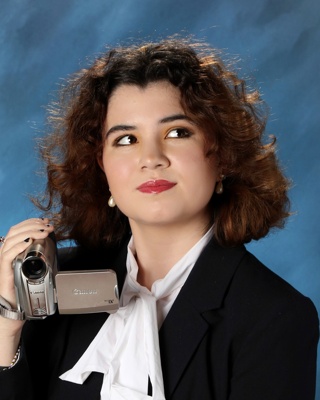Outside the Performing Arts Center, hushed voices and whispered conversations bubble up as crowds of people–students, staff, and parents alike–scuffle along into the Landback Auditorium, the lights above bright and beaming. They find their places in the audience, pushing politely past each other in hopes of finding the best seat. There is a buzz of excitement that saturates the air, and as the lights begin to dim and the curtains draw open, a keen eye might make out shadowy figures slinking across the stage in the dark.
These shadows, who are dawned in all-black attire, are not made up of the cast–instead, they are the silhouettes of the many crew members who work from booth to stage, performing their own kind of show from behind the curtains.
While the audience may never lock eyes with one of the elusive students hoisting the ropes or manning the lights from behind them, they play as much of a role in the flow of performance as the actors who are under the spotlights.
“Stage crew is, aside from acting, what makes up the entirety of the play,” Stage Manager Isabella Rahlfs said. “Without a stage crew, there simply wouldn’t be a play. It’s the stage crew who manages costumes, set pieces, props, and all of that.”
Backstage, there is always something to do. Stage crew members are always occupied with tasks that help keep the show on the road, and from the moment they put on their stage crew “costumes,” they are moving nonstop.
“Before the show starts, we have the assistant stage managers call the actors for places, we get all the tech crew in, and they take places for the first scene opening. Each crew member gets a list of all the props and set pieces they are responsible for,” Assistant Stage Manager Anderson Metcalf said.
The operation of Stage Crew is dependent on the cooperation of every person involved and challenges members in a multitude of different ways. From quick thinking to physical movement, it demands the most out of every member. But above all that is required of Stage Crew members, teamwork and cooperation is what holds it all together.
“The most important part of stage crew is being able to work with the team, to get things moving on and offstage as fast as possible,” Metcalf said.
Just like in a team sport, Stage Crew requires the commitment and movement of everyone as one large unit. This cooperation is especially important for those who are stationed on the stage, otherwise known as the deck crew, who work hands-on with other members.
“Deck crew specifically, requires moving set pieces around, making sure props are in place, and possibly going to find actors who have disappeared, along with flying in and out anything, like the curtains,” Ralphs said.
To make sure that the members of stage crew are able to cooperate seamlessly, the management team dedicates their efforts to planning and rehearsing, often months in advance. Their work before the last few weeks of play preparation facilitates the final product of a working team of actors and stage crew members.
“We are a part of the process from the beginning,” Rahlfs said. “We take blocking notes during rehearsals and manage props and sets. But when it comes down to the actual show and tech week, it is all about getting comfortable with the show and running through it. It’s practice, practice, practice.”
Stage crew members, especially the management team, dedicate innumerable hours to achieving the final production. These long hours spent together are invaluable to forging important team bonds between stage crew members and creating their own community.
“We have some little traditions in tech, one of the most important ones is our crew ‘Bible’, which we call ‘the Brew.’ It’s evolved into a huge collection of papers and packets for the tech crew. There are just lots of fun little things like that.” Metcalf said.
These little moments of calm between productions are what become the most memorable for those who participate in stage crew. From their own form of religion to an endless supply of inside jokes, the work and the fun balance out beautifully backstage.
“It’s high-pressure at times, but it can also be really fun,” Rahlfs said. “My favorite parts about being on stage crew are when we get completely distracted and are talking about something completely irrelevant, especially on the mics. I love just being a part of it and it’s just fun, to create something.”
No matter the difficulty of a scene change, the complexity of the sound system, or the length of tech week rehearsals, those who work on stage crew are dedicated to making sure that the show will always go on, whether from under the spotlight or behind the curtains.



